About ex.editor:
Olga A. Bogdanova, DSc in Philology, Leading Research Fellow, Department of Russian Literature of the Late 19th – Early 20th Centuries, A.M. Gorky Institute of World Literature of the Russian Academy of Sciences, Povarskaya 25 a, 121069 Moscow, Russia.
ORCID ID: https://orcid.org/0000-0001-7004-498X
E-mail:
Acknowledgements:
The publication was prepared and implemented in the A.M. Gorky Institute of World Literature of the Russian Academy of Sciences at the expense of the State Literary and Memorial Museum-Reserve of A.P. Chekhov “Melikhovo”
Abstract:
The publication is based on a comparison of the variants of the “estate topos” in the works of Russian literature and literature of other nations of the late 19th — early 21st centuries with their real-empirical prototypes, living in the memory and imagination of the creators of artistic images. On the material of the works by L.N. Tolstoy, A.P. Chekhov, I.A. Bunin, G.I. Chulkov, E.N. Chirikov, A.A. Akhmatova, V.V. Nabokov, M.M. Prishvin, S.N. Durylin, B.L. Pasternak, E.R. Dombrovskaya and other Russian writers, the authors of this monography find out the regularities of the transformation of the real elements of the estate complex and facts of author’s biographies into the details of the subject depiction and the multilayered symbolism of the world of the artistic work. The comparative aspect seriously presented in the book allows us to emphasize in the “estate topos” universal features that are relevant both for Russian literature and for the literature of Spain, Italy, England, France, Ukraine and other countries since Antiquity. The authors also continue to consider the phenomenon of dacha in Russian literature and culture, and begin an analysis of the elements of the “dacha topos” and the discourses that fill it. The сollective monograph contains articles by 23 authors, distributed in 6 problem- thematic sections, reflecting the most important “vectors of creative transformation” of empirical reality: innovations in the field of poetics of artistic works, analysis of ego-documents and artefacts, interdisciplinary integration, comparative parallels, etc. The publication is intended both for specialists (academics, teachers, research students and undergraduates) and for the general reader interested in the place of the Russian estate in literature and in world culture.
CONTENTS
Foreword
Olga A. Bogdanova. The living roots of literary estates
Part I
Chekhov and others
Valeria G. Andreeva. Squires and landowners in the novel “Anna Karenina” by Leo Tolstoy
Yuri V. Domansky. “Ranevskaya’s estate” and “Gayev’s homestead”: on the issue of nominations of location in “The Cherry Orchard” by Anton Chekhov
Anastasia A. Zhuravleva. The Chekhov case: The world of Russian estate in the chronotope of the “large city”
Maria V. Mikhailova, Anastasia V. Nazarova. “Rebellious estates” in E.N. Chirikov’s prose
Olga A. Bogdanova. The “estate text” by Georgy Chulkov: the neo-mythology of writer’s names in the story “House on the Sand”
Part II
Poetic chronicle of the Russian estate
at the turn of the XIX–XX centuries
Tatiana M. Zhaplova. Subject detailing as an instrument of poetization of the estate life in the lyrics by I.A. Bunin of the 1890s–1900s
Yuliya V. Shevchuk. “Self-observation” in space: Russian estate in the lyrics of Anna Akhmatova of 1910s
Olga A. Grinevich. Interaction of fact and fiction in the “estate” poetry of V.V. Nabokov
Part III
The Russian estate in ego-documents and artefacts
Elena A. Andrushchenko. Forms of poeticization of “estate culture” in “Memoirs of Boris Nikolaevich Chicherin”
Mikhail V. Stroganov. Bernovo’s Legends: the noble estate in the memories of its alumnus in the 20th century
Application. Memoirs of A.N. Ponafidina, O.N. Wulf, A.N. Bolt. Publication by Mikhail V. Stroganov
Anastasiya V. Firsova. The “Pasternak’s garden”: the poetic matrix in landscape
Part IV
Estates of the Soviet era
Natalia V. Prashcheruk. Jukovsky’s Orekhovo estate: “feeding landscape” and museum reality (based on E.R. Dombrovskaya’s “Sighs of the chained. Russian saga”)
Elena.Yu. Knorre. “Kitezh of the Soviet era”: the image of the “Heavenly commune” in the “estate myth” of М.М. Prishvin (based on the writer’s diary, 1920–1950s)
Maria S. Akimova. Estate real and estate literary in the fate and work of S.N. Durylin
Part V
Comparative plots
Jose Luis Calvo Martinez, Natalia N. Arsentieva. The philosophy of solitude (Beatus ille theme) in the “estate” poetry of Europe: Horace, Fray Luis de León, I.A. Bunin
Ekaterina E. Dmitrieva. Fables Collection in the Open Air: a Competition of Poets in the Versailles Labyrinth
Alexandra V. Toichkina. P.A. Kulish-farmer and his “farm philosophy” in the historiosophical perspective of the 21st century
George A. Veligorsky. Blue Hills and distant music: images of prison and freedom in children’s and autobiographical literature of Great Britain and Russia (estate context)
Vassili E. Molodyakov. Charles Maurras and His Estate Chemin de Paradis: constructing meanings
Part VI
At the origins of the “dacha topos”
Evgeniya N. Stroganova. Dacha plots in women’s prose of the turn of the 19th – 20th centuries
Emilio Mari. On the Concept of Petersburg “Dacha Folklore” of the late 19th – early 20th century
List of Illustrations
List of Accepted Abbreviations. Comp. by Elena Yu. Zhivitsa
Index of names. Comp. by Elena Yu. Zhivitsa



